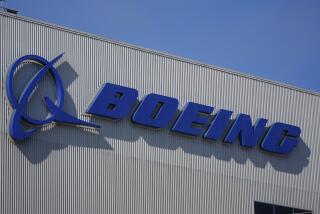UAW Picks Ford as Lead Company in Negotiations on Auto Contract
- Share via
DETROIT — The United Auto Workers union chose Ford Motor Co. as the lead company for negotiations on a new industrywide labor contract, sources close to the talks said Tuesday.
The decision, which top union officials confirmed late Tuesday, comes after nearly three months of discussions with Ford, General Motors Corp. and Chrysler Corp.
No public announcement about the decision is expected from the union, which will continue low-level talks with Chrysler and GM while the more substantive discussions go forward with Ford.
But UAW President Stephen Yokich met with Ford’s top negotiators Tuesday and indicated that the auto maker will be the lead company in the negotiations, a source said.
Ford issued a statement Tuesday night that said low- and high-level talks are continuing with the union. “We are encouraged by the tone of the negotiations,” spokesman Jon Harmon said.
All three companies indicated they wanted to lead the negotiations since it would give them a better opportunity to forge a contract that best fit their needs.
But the union believes Ford is the most flexible of the Big Three and might offer the best hope for reaching an innovative solution to the problem of shifting jobs to outside contractors, the biggest stumbling block in a negotiating year that most observers believe is unlikely to produce a strike.
In recent years, Ford has had the best relationship of the Big Three with the UAW. That relationship was solidified when Yokich was the UAW’s chief negotiator with Ford. He counts among his friends Peter Pestillo, Ford’s vice president of corporate relations, who oversees labor negotiations.
Ford and the UAW have worked together on a number of innovative programs, such as education and training. Analysts believe this close working relationship may help the two sides find some fresh solutions to the outsourcing problem. Ford has already shown a willingness to encourage some of its nonunion suppliers not to oppose union organizing at their plants.
“When we need to get a principle established, we’ve gone to Ford,” said Ernie Lofton, a UAW vice president who handles negotiations with the auto maker.
When talks began with the Big Three in June, Ford was considered a longshot to be the focal point of the negotiations. Chrysler was the early favorite because it is making record profit and had not led the talks since the early 1970s. GM was also a possible candidate because it has the most pressing problems.
UAW represents 400,000 auto workers.
The current three-year contract expires Sept. 14. The UAW was expected to name a lead company on Aug. 22, but Yokich said negotiations were progressing so well that there was no reason to narrow the discussions of major issues to just one auto maker.
In the past, the UAW has chosen a so-called strike target for intense negotiations just before the expiration of the contract. The deal was then taken to the other companies as a “pattern” agreement they are expected to sign with few changes.
Yokich, who has the image of a militant but a record as a pragmatist, has signaled a willingness to change the union’s tactics to fit the realities of today’s marketplace.
In a recent news conference, he backed away from using the term “strike target” and professed not to know what a pattern agreement was. He said his job was to negotiate a contract and not lead his members into a strike. While wages and benefits might fit a pattern, he said other contract terms might differ to fit the particular circumstances of each company.
The main issue for the UAW in the current negotiations is job security, while for the companies it is competitiveness. The two priorities collide over the practice of outsourcing, or contracting jobs out to nonunion suppliers.
In addition to job security, the union is likely to press the companies for yearly wage increases of at least 3%. The companies are likely to push for lower starting wages for new hires. The auto makers also may grant concessions in return for a contract longer than the traditional three years.






